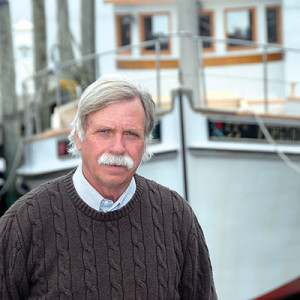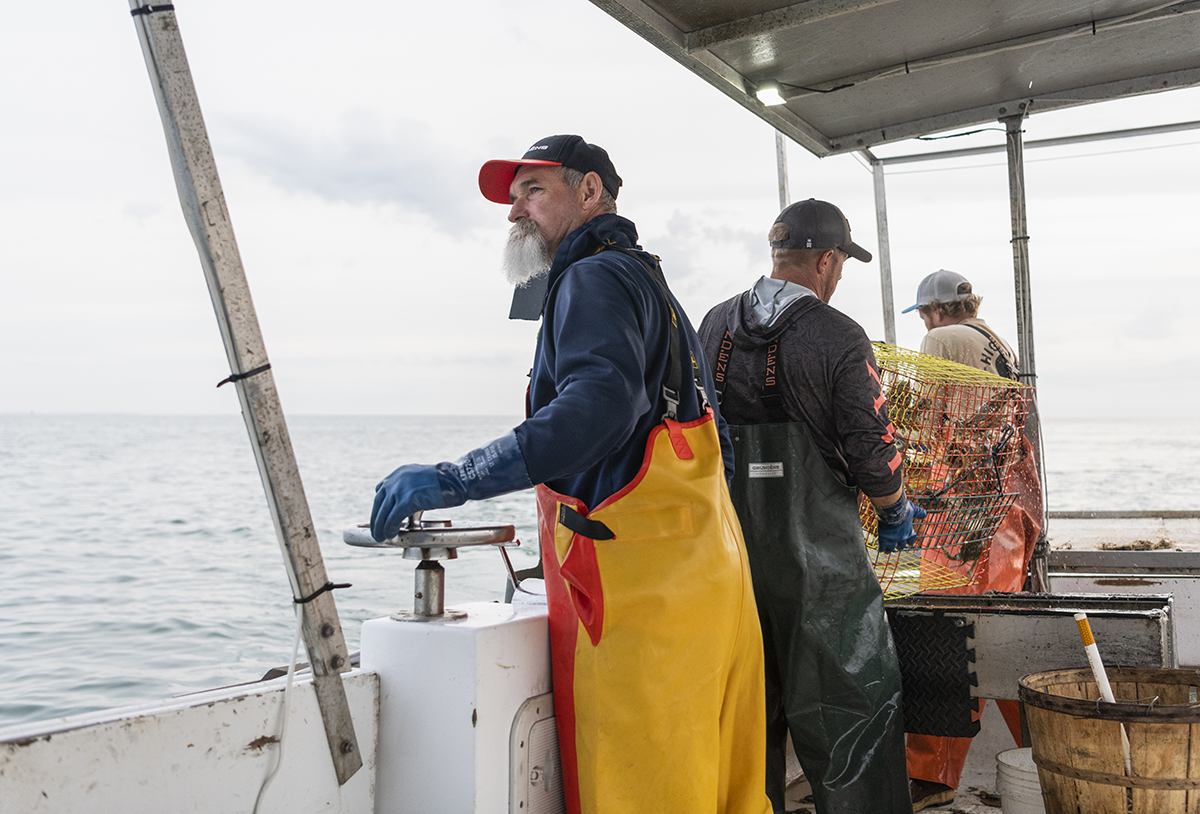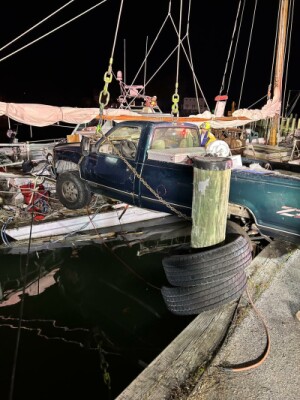The day-to-day life of a working waterman is constantly dealing with challenges that just come from being a commercial fisherman.
While operating Kenneth T. Heath Seafood in Townsend, Va., Eastern Shore waterman Kenny Heath and Linda, his wife of 38 years, have faced it all together their entire marriage.
That day-to-day adversity was magnified for the Heaths when on Oct. 16, 2022, the couple were riding home on a motorcycle from the Daytona Biktoberfest. They were both nearly killed on Interstate 95 just south of Savannah, Ga., when they crashed going 70 m.p.h. into the back of a utility trailer.
Linda’s left foot was severed from her leg at the scene, and Kenny’s left leg and arm were greatly jeopardized. After being in a coma for two days, Kenny awoke to life-threatening injuries and faced a decision on whether or not he should go through the year-and-a-half and over 100 operations that doctors said would be needed to save his leg.
“I never thought about giving up or feeling sorry for myself,” says Kenny sitting in the helmsman chair on his boat. “My thoughts were only about how Linda and I would move forward. Every year that I’ve worked the water, I’ve had to face some type of adversity. I’m used to adversity. When I asked the doctor, ‘If I do the reconstruction surgery will I be able to go back to the water?’ When he said, ‘No’ I made up my mind to amputate.”
It was 10 days after the accident that Kenny made that decision and instructed doctors to amputate his leg. His left leg was amputated above the knee, and bone grafts were applied to reconstruct his left arm.
"Every year that I’ve worked the water, I’ve had to face some type of adversity. I’m used to adversity"
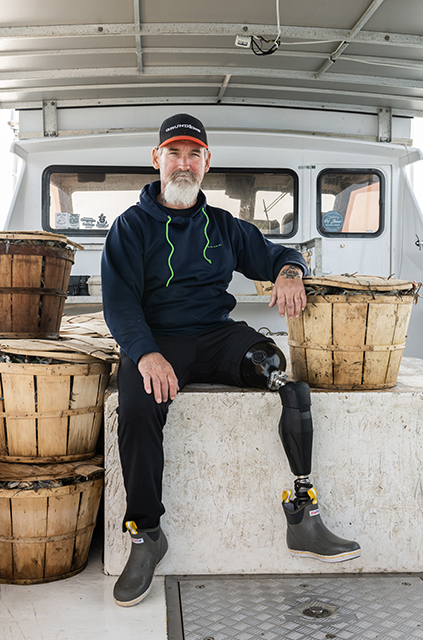
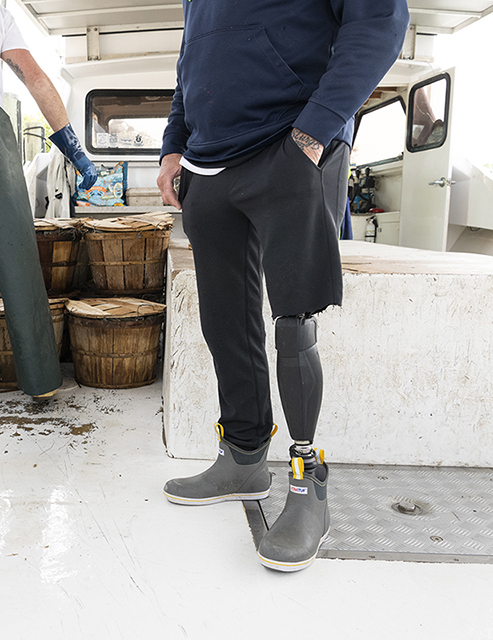
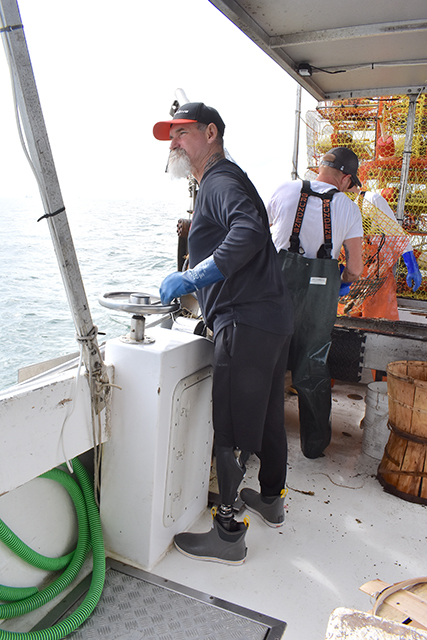
A day on the water
Five months and a week after the accident, Kenny and his crew were back fishing crab pots aboard his 40’x13.5’x54” fiberglass workboat, the Thomas Jaiden, named after the Heaths’ first two grandchildren.
At 4:30 a.m. on Friday, April 14 Kenny and his crew of two were at the dock at Cape Charles, Va. getting readying for of fishing. Kenny and his veteran crew have worked together for four years.
After the accident, the only modification made to the boat for Kenny was a portable fiberglass three-stair step that is lowered into the boat to help him get on and off the boat. Other than that, everything is the same on the Thomas Jaiden.
When aboard the boat, Kenny went straight to the pilothouse and jumped up in the helmsman seat as his crew Justin Travis, 38, and Chris Derwort, 28, disengaged lines and prepared for a day of fishing. Kenny cranked up the 1150 h.p. C18 Caterpillar Diesel engine.
As he sat in the seat, warming the engine up, he pulled out his cell phone. He has a prosthetic leg with a wireless Bluetooth connection in his phone that allows him to set the leg in either bend or lock mode. The Genium X3 prosthesis cost $145,000 but according to Kenny is worth every penny, as it is a key part of the miracle that has allowed him to continue to work.
When working pots at the outside helmsman station, he stands all day with his leg in a locked mode position. “I tried it both ways but I found that the lock mode keeps the knee from bending and allows me to stay steady on my feet,” he says.
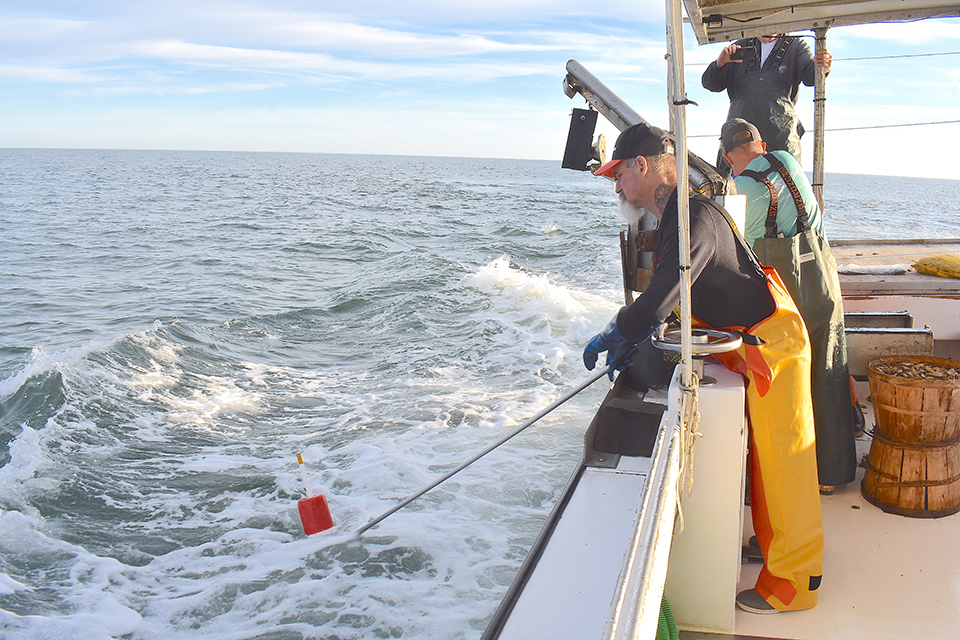
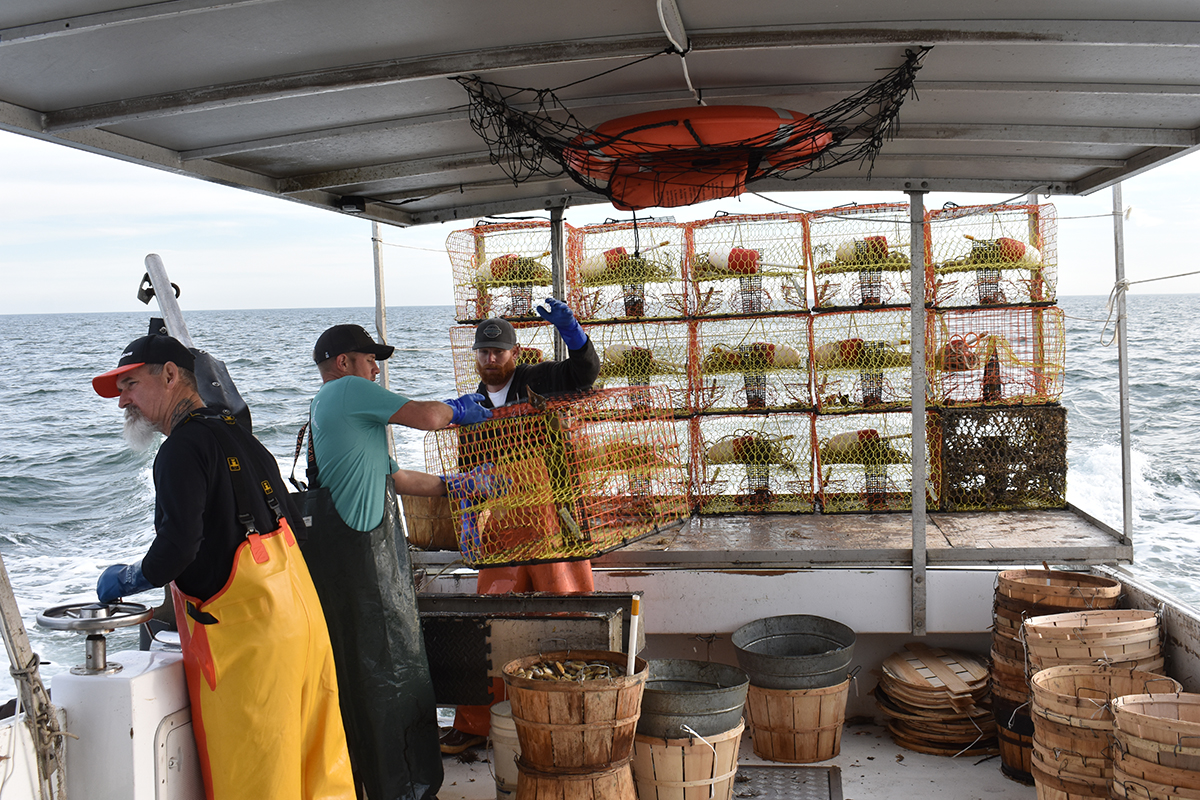
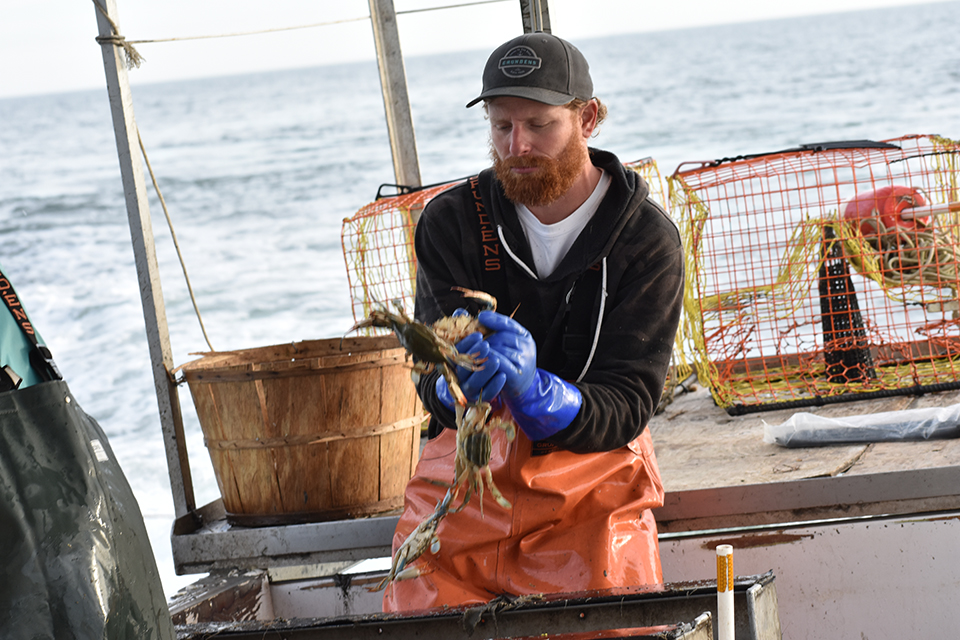
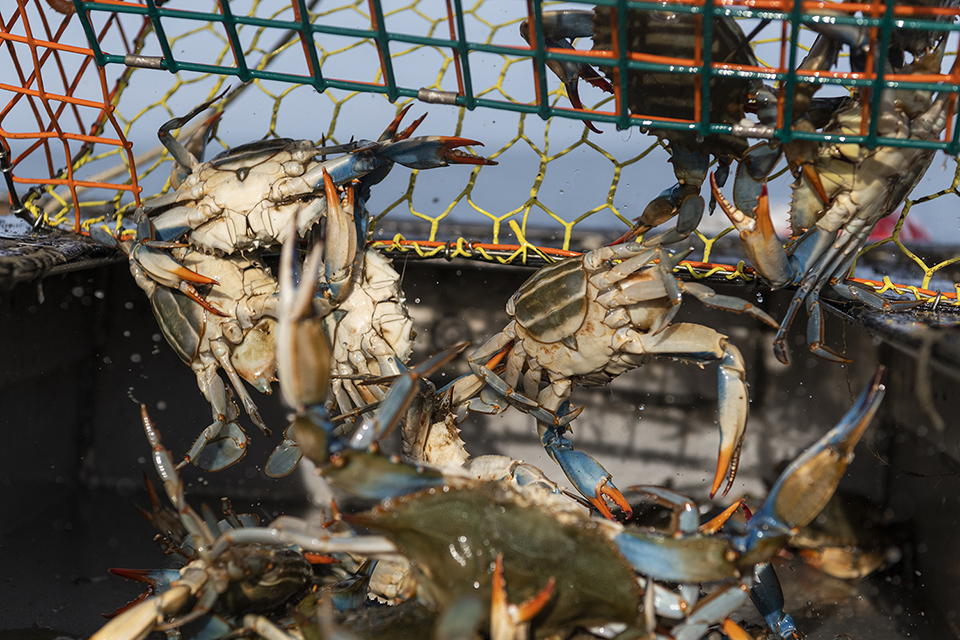
He feels blessed that the accident mostly impacted the left side of his body. “I’m right-handed and -footed and I use my right hand and right foot mostly to work my crab pots,” he says. “I’m able to work the same way on the boat that I did before the accident.”
With lines were ready and everything else ready to go, Kenny steered the boat out to the mouth of Cape Charles Harbor, and when out in the bay throttled her up and headed for his first line of pots near Old Plantation Flat Light in the bay. He has a license to fish 425 crab pots.
On arrival at the first line of pots, the sun was peeking through the darkness. But the tide was running hard and dragging Kenny’s crab pot buoys underwater, making it hard to see the buoys.
When the tide slowed, crabbing began, and it was obvious Kenny and crew were seasoned watermen. When potting, Kenny steered the boat, used a handheld gaff to hook the rope and buoy, placed the rope into the pot hauler, and then engaged the hauler by using his good foot to work the floor foot pedal.
When a pot surfaced, Justin pulled the pot from the water and disengaged the line from the hauler. Chris releases the pot opening to let the crabs out. Justin flipped the pot over and emptied the crabs onto a stainless steel culling station. Cat-quick, the pot was emptied. Chris baited the pot with razor clams, and Justin had it back in the water in an instant. With the pot back in the water, Chris culled the crabs, throwing undersized crabs overboard and legal size crabs into the appropriate bushel baskets – a process that goes on over and over with each pot
Just like clockwork, the crew continued to fish lines of pots all day and, by 10:55 a.m., had the 27-bushel limit, having fished 250 pots. There were two bushels of prime jimmies and 19 bushels of sooks.
After catching his limit, Kenny full throttled the 1,150 h.p. engine and arrived back at Cape Charles in about 35 minutes. A crab buyer was there waiting at the dock in a refrigerated truck to take his catch. After the catch was off-loaded, Kenny, with one flick of his wrist and blink of an eye, steered the boat back into his mooring slip.
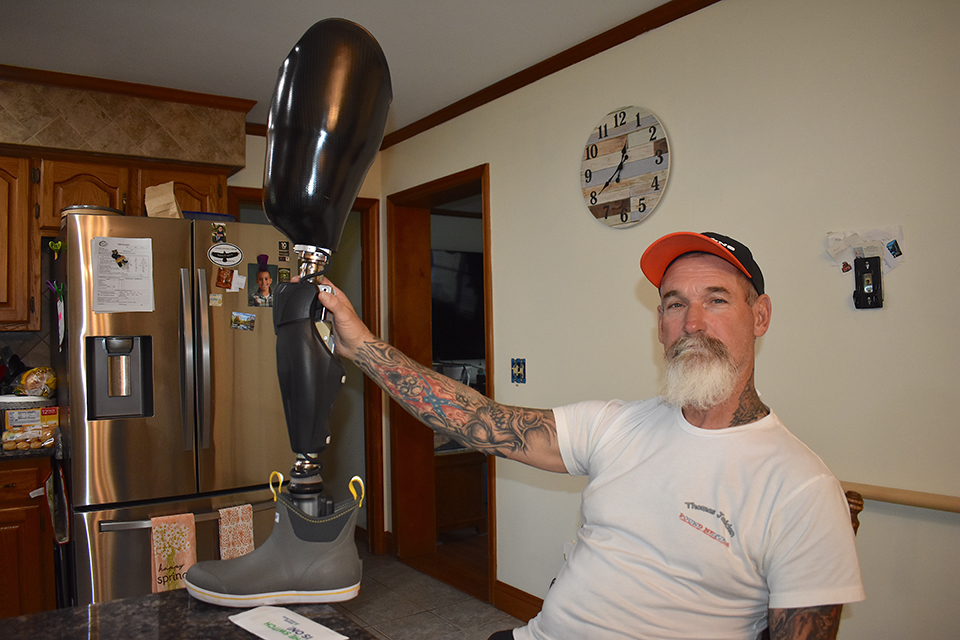
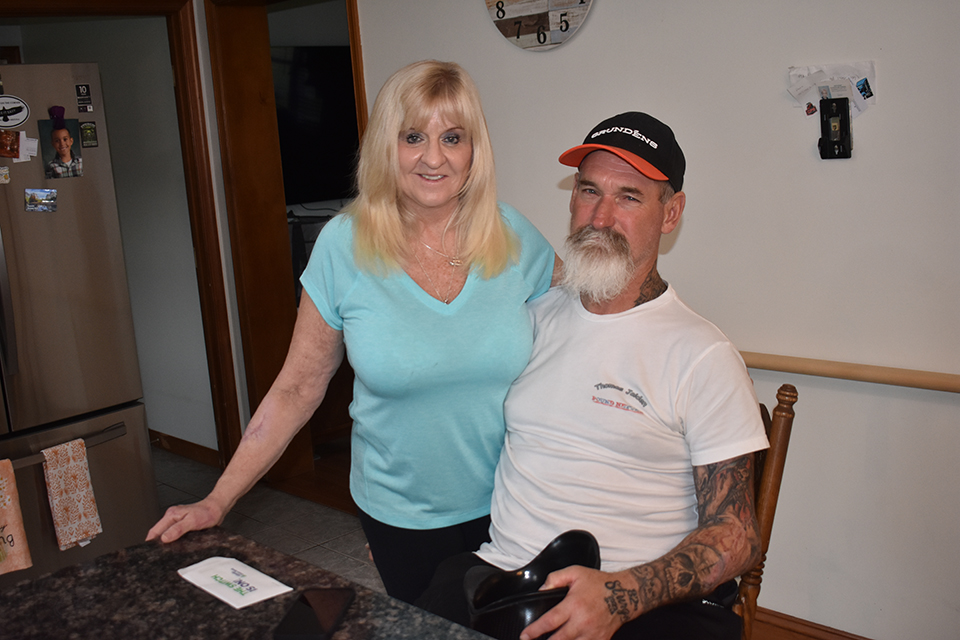
A short talk with Kenny and Linda
After a day of fishing, Kenny and Linda sat down in their kitchen and reflected on their experience. “We would not be alive today if it wasn’t for our helmets,” says Linda. “A lot of things had to go right for us to have survived that accident.”
“We found out that we have a lot of friends too who gave money and support to us,” says Kenny. “My hospital bill alone was over $400,000, and we were blessed that insurance covered most of it, but we had a lot of other expenses that were not covered.”
As part of their recovery, Kenny and Linda set goals for themselves. “My main goal was to be on my boat working my crab pots this season, and Linda wanted to be on the boat at the annual Cape Charles docking contest,” says Kenny.
Unfortunately, Linda recently slipped on a towel and re-injured herself. She will not be able to participate in this year’s docking event. She has been one of the organizers of the event for many years.
“Yes, I’ve had a hiccup, but it is not the end of the world,” says Linda. “I’m still keeping the books for the business. We are going to keep moving forward. Throughout all of this doctors, nurses, friends, and family have just been wonderful.”
“I can’t thank everyone enough for their support,” says Kenny. “We have a long ways to go with this but we are going to continue to work through all the hardships with this to live a normal life.”




